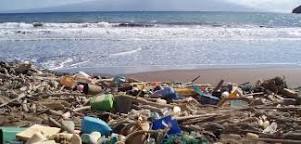Intensive use of our ocean and runoff from land-based pollution sources are just two of many factors that stress our fragile ocean ecosystems—and increasingly lead to human health concerns. There are tons of waste that makes its way into the ocean each year.
One of the articles I read said "Waterborne infectious diseases, harmful algal bloom toxins, contaminated seafood, and chemical pollutants are other signals that oceans can affect our health."
Just think about the marine life in the ocean... they are exposed to potential ocean health threats such as toxic algae or poor water quality 24 hours a day, seven days a week. They can shed important light on how the condition of ocean environments may affect human health now and in the future.
This image I am attaching is becoming more and more of a reality on our coastlines each year.


